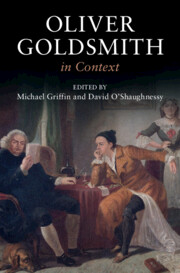Book contents
- Oliver Goldsmith in Context
- Oliver Goldsmith in Context
- Copyright page
- Dedication
- Contents
- Illustrations
- Notes on Contributors
- Preface
- Chronology
- Abbreviations
- Part I Life and Career
- Part II Social, Cultural, and Intellectual Contexts
- Part III Literary Contexts
- Part IV Critical Fortunes and Afterlives
- Chapter 31 Editions
- Chapter 32 Critical Reception before 1900
- Chapter 33 Critical Reception after 1900
- Chapter 34 Afterlives 1: The Victorian Vicar
- Chapter 35 Afterlives 2: Theatre
- Chapter 36 Afterlives 3: Poetry
- Further Reading
- Index
Chapter 32 - Critical Reception before 1900
from Part IV - Critical Fortunes and Afterlives
Published online by Cambridge University Press: 28 November 2024
- Oliver Goldsmith in Context
- Oliver Goldsmith in Context
- Copyright page
- Dedication
- Contents
- Illustrations
- Notes on Contributors
- Preface
- Chronology
- Abbreviations
- Part I Life and Career
- Part II Social, Cultural, and Intellectual Contexts
- Part III Literary Contexts
- Part IV Critical Fortunes and Afterlives
- Chapter 31 Editions
- Chapter 32 Critical Reception before 1900
- Chapter 33 Critical Reception after 1900
- Chapter 34 Afterlives 1: The Victorian Vicar
- Chapter 35 Afterlives 2: Theatre
- Chapter 36 Afterlives 3: Poetry
- Further Reading
- Index
Summary
‘Critical Reception before 1900’ presents the early history of Goldsmith’s critical reception and surveys concerns which recur in critical treatments. Two themes in particular recur. The first is that of an elegant versatility that fails to sustain its genius. A second critical theme sees apparently autobiographical episodes in Goldsmith’s works flow in to fill the gaps in his biography. Anecdotes of his character proliferated after his death in 1774, and 200 years later G. S. Rousseau would declare Goldsmith’s life to be the major obstacle to in-depth criticism of his writings. From the early nineteenth century a fondly sentimentalized authorial figure dominated responses to Goldsmith’s fiction and to the landscapes of his major poems. Some critics did consider the sociopolitical and moral arguments of Goldsmith’s works: his critiques of luxury and his comparative surveys of human happiness remained active in his familiar appeal to Victorian readers.
- Type
- Chapter
- Information
- Oliver Goldsmith in Context , pp. 271 - 280Publisher: Cambridge University PressPrint publication year: 2024

